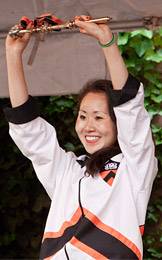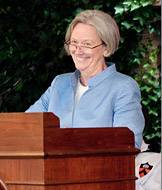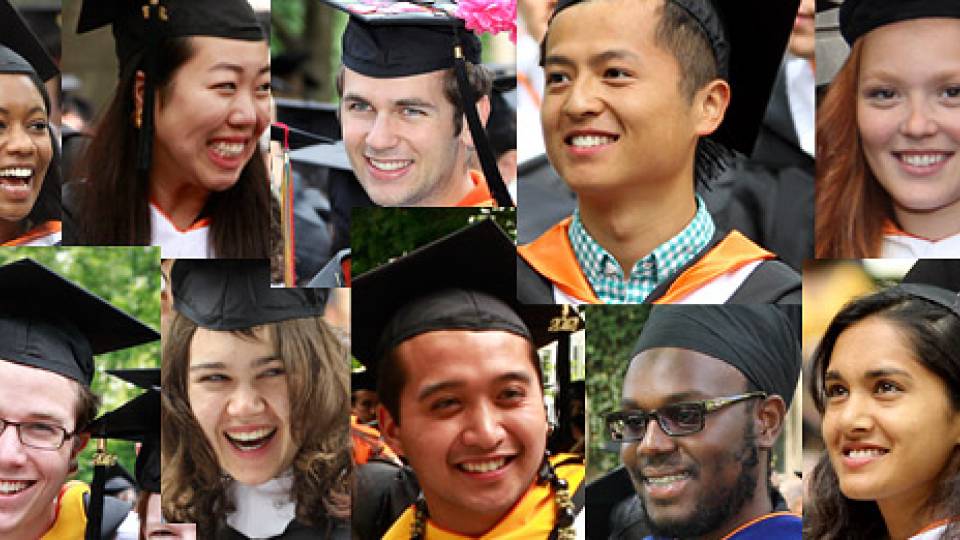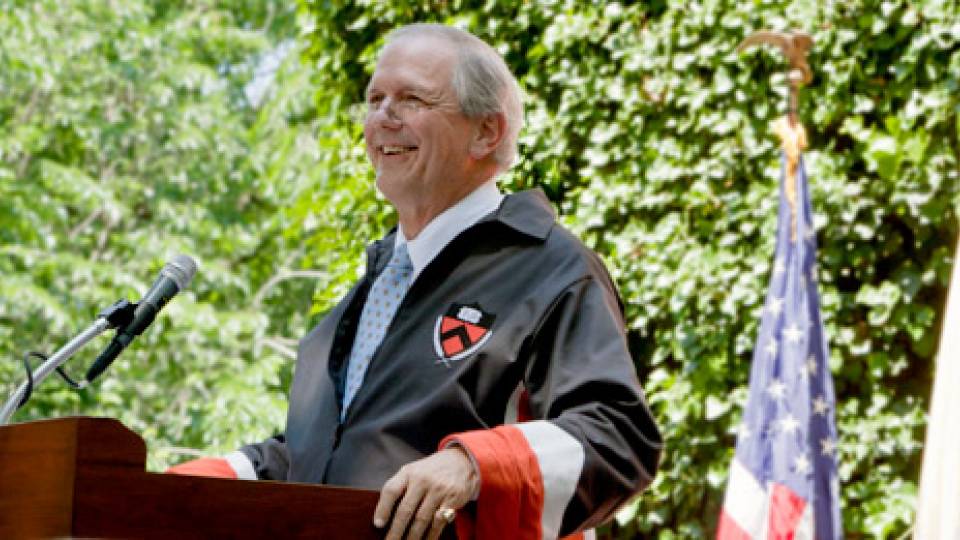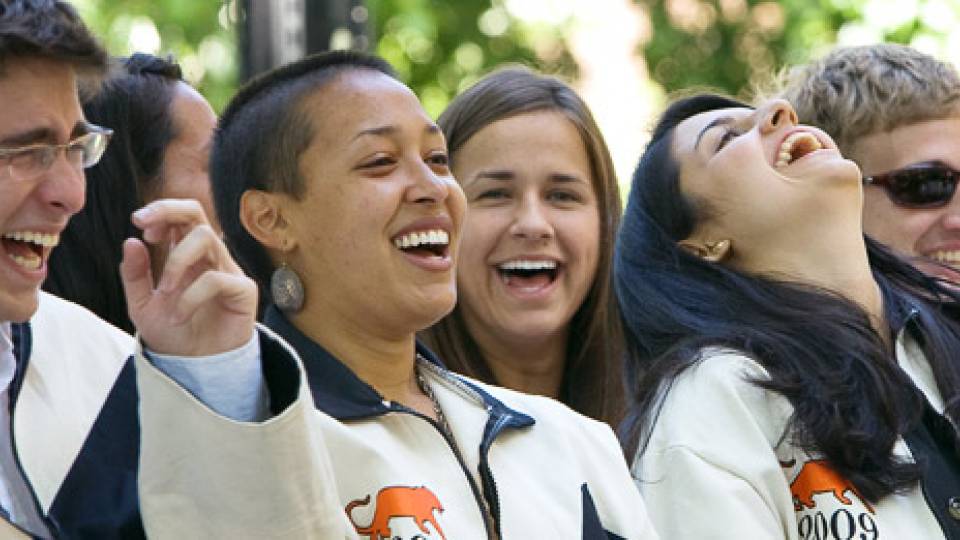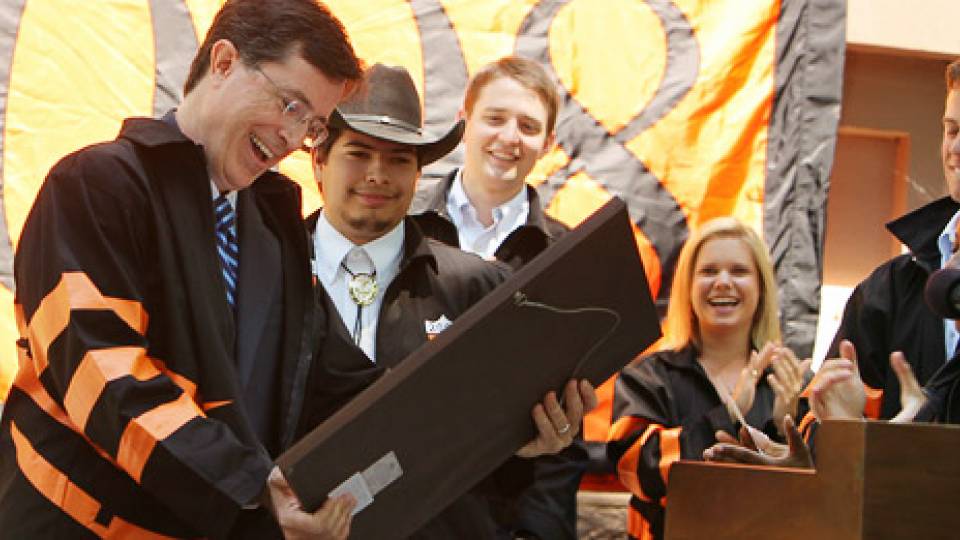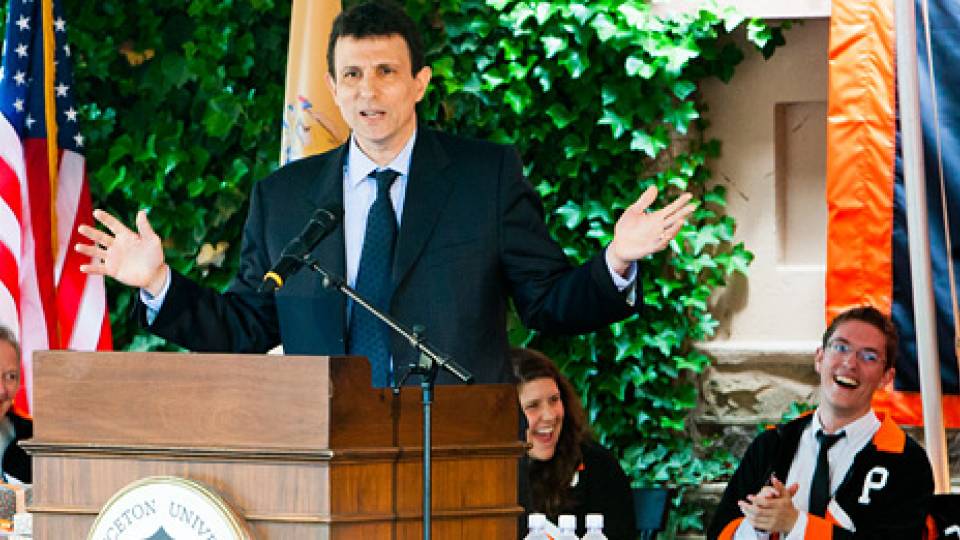A celebratory mood reigned — even amid heavy rain — on Princeton’s Cannon Green as members of the Class of 2012 gathered for the Class Day ceremony Monday, June 4, to reflect on the joys and trials they shared as students and to recognize the accomplishments of their peers.
Prior to the keynote speech(Link is external) by actor and comedian Steve Carell, the day’s spirit of unity was established by senior class president Lindy Li — described by Class Day co-chair Christopher Green as the “nicest dictator” he knows — who spoke of a bond forged by four years of hard study.
“You made it through because of something in you that strives for something better,” Li said. “Our school is an identity. … It is a way of life.”
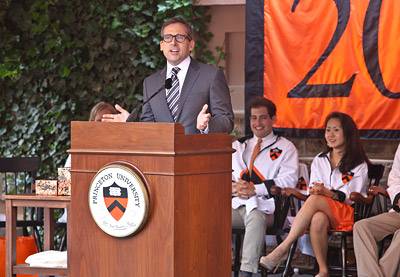
In his Class Day address, actor and comedian Steve Carell gave the graduating seniors a lighthearted scolding for relying too heavily on technologies like texting and tweeting in favor of personal interactions. “You are young,” he told the students. “And because of that, you are wrong.” (Photo by Steve McDonald)
Carell — best known from two iconic shows of the Class of 2012′s generation, “The Daily Show With Jon Stewart” and “The Office” — opened with his own characterization of Princeton: “As some of you may know, Princeton is one of the world’s great universities: A place of intellectual and artistic excellence, a bastion of knowledge, a football powerhouse.” (The Tigers have not had a winning football season since 2006.)
Carell proceeded to lament the waning of personal interaction in the Digital Age, opening with a traditional college orientation exercise of having each student look at the person on either side of them.
“What do we learn from this exercise? We learn that nobody looks each other in the eyes anymore,” Carell said. “As human beings, we should naturally crave contact with one another, but sadly as the world grows more and more technologically advanced we lose our ability to connect as human beings.”
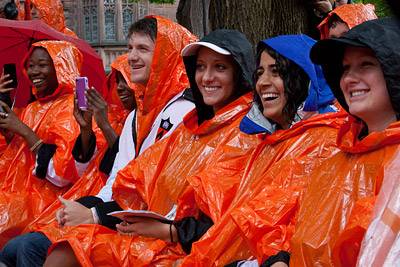
Many students in the audience covered their customary class jackets with ponchos while enjoying the ceremony. (Photo by Denise Applewhite)
In his days as a college student, Carell recalled, he had to ask out a girl — and face rejection — in person, not by text. “My point is that I suffered and you should have to suffer, too,” he told the graduating seniors.
He then released a barrage of techno-terms — texting, tweeting, NSFW, LMFAO, etc. — before reminiscing about the simpler, more tangible precursors to today’s most prominent technologies.
On e-readers: “Unlike a Kindle or an iPad, books had a certain smell, a certain feel. They had their own fascinating history. Countless readers before me had touched that book, breathed on it, stuck their gum between the pages. Maybe left Dorito fingerprints. A book was perspiration and flakes of dead skin and dandruff. It was the DNA of generations of college students before me. … Books were magical then.”
On Google: “When I was in college, if we didn’t know something, we didn’t ‘Google’ it — we just made an educated guess. Or we made it up. We pretended that we knew and that was good enough. If a person believed they were right it was just as good as actually being right. And if you weren’t right, you could leave before anyone had time to check your facts. Those days are gone now. Everybody knows everything.”
On cellphones: “Kids and their parents are in constant contact. When I was in college, I would call my parents for three reasons: when I needed money, when I was thinking about changing my major and when I got a person pregnant. Today, parents are much more attuned to their children’s college experience, but I wonder, is this right? Isn’t college supposed to be the time when you go from hating your parents to simply not caring about them?”
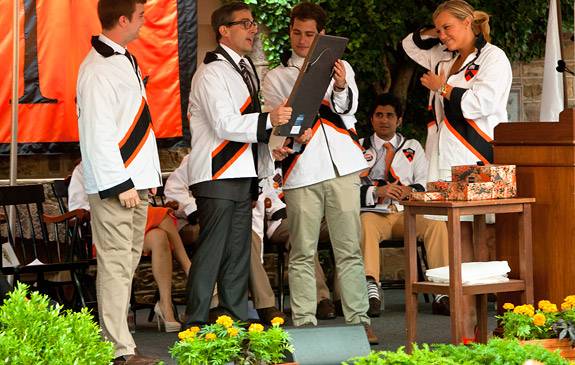
Carell accepts his honorary membership to the Class of 2012 from Class Day co-chairs (from left) Christopher Green, Gabriel Debenedetti and Erin Kiernan. (Photo by Steve McDonald)
Carell told the students: “Have we lost touch with our simpler selves? I believe we have. And by ‘we,’ I mean you. You are young. And because of that, you are wrong.”
The Massachusetts native told students of his purchase in 2009 of a 150-year-old general store in Marshfield, Mass. Threatened with permanent closure before the purchase, the store acted as a gathering place for the community. Carell used the store as an example of preserving the old, threatened ways of socializing and to urge students at the very least to strive to be personable and kind. (Advice he offered after reminding them that “regime” and “regimen” are not interchangeable, and exhorting them to “get a dog because cats are lame.“)
“Every once in a while, put something positive into the world,” Carell said. “We’ve become so cynical these days — and by ‘we,’ I mean us. So do something kind. Make someone laugh. And don’t take yourself too seriously.”
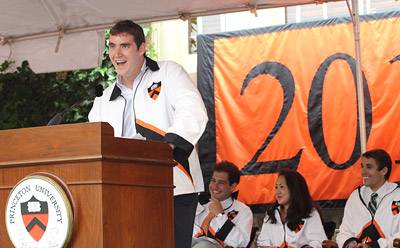
Spencer Gaffney, one of the students speakers at Class Day, told his classmates that “for four short years we owned the school, made it our own, and now we have something to which we all will belong for the rest of our lives.” (Photo by David Kelly Crow)
Later, during her speech, Princeton President Shirley M. Tilghman elicited a high-five from Carell when she landed a “That’s what she said” joke — the infamous one-liner of Carell’s character from “The Office,” Michael Scott. (Carell earlier told students to only use the joke if they cannot resist and never try to explain it to their parents.)
In keeping with Class Day’s less formal tone, Tilghman bid the Class of 2012 farewell, encouraging them to “go forth and puncture the [orange] bubble. Be in the nation’s service and the service of all nations. Change the world and live up to every Commencement cliché I will utter in the next 24 hours. Make us proud.”

Students laugh along with one of the humorous addresses at Class Day on the rain-soaked Cannon Green. (Photo by Steve McDonald)
Student speaker Spencer Gaffney expressed how the four long years ahead as freshmen abruptly became the bittersweet last moments that remain for seniors.
“Eventually we learned to count the time we had left at Princeton in weeks rather than semesters, than in days rather than weeks, and now, finally, in hours, trying to trick ourselves into believing that if we keep using smaller and smaller units, we can make our time at Princeton last forever,” Gaffney said.

Members of the Class of 2012 enjoy some bonding time at the Class Day event. (Photo by Denise Applewhite)
“It can’t, of course. And maybe that’s not a bad thing,” he said. “Princeton existed before us and it will continue after us. But the great thing about our time here is that for four short years we owned the school, made it our own, and now we have something to which we all will belong for the rest of our lives.”
Clayton Raithel, Class Day’s second student speaker, also touched upon the camaradie born from his and his classmates’ time at Princeton. “If the insurmountable roadblocks at Princeton have done anything for me, they have made me bond more closely with all of you,” Raithel said. “And next year, whenever the going gets tough, I’ll take it to heart that there are other 2012-ers out there with me. And that will be all the strength I need.”
In addition to the speeches, seniors were presented with awards for community service, athletics and leadership. The class also named its honorary class members, including Carell, University staff members and Derek DiGregorio, a student at John Witherspoon Middle School.
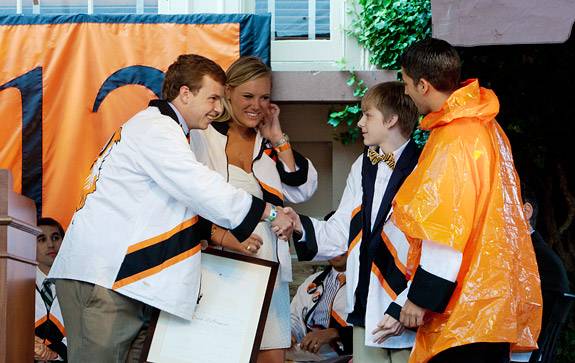
The Class Day ceremony featured the induction of honorary members of the Class of 2012, including Derek DiGregorio (second from right, shaking hands with senior John Monagle). DiGregorio, a student at John Witherspoon Middle School in Princeton, started the organization Derek’s Dreams to raise awareness about the rare degenerative disease Ataxia Telangiectasia. (Photo by Denise Applewhite)
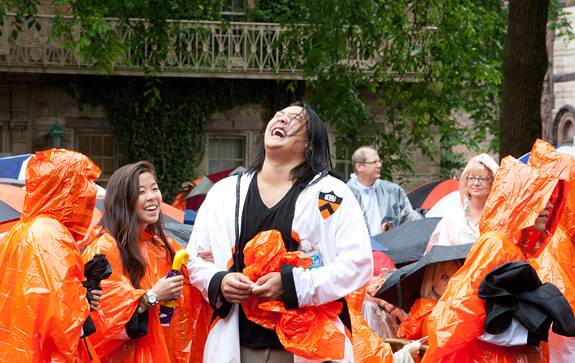
Even rain couldn’t dampen the spirits of seniors who shared many laughs at Class Day. (Photo by Denise Applewhite)
Graduate School hosts Hooding ceremony
Late Monday afternoon, advanced-degree candidates participated in the Hooding ceremony at McCarter Theatre. The ceremony — which was scheduled to be held for the first time on Cannon Green — was moved because of weather concerns. Tilghman alluded to the change in speaking to the graduates.
“At Princeton, the first time we deviate from tradition, it is considered a travesty; the next year it is considered interesting; and by the third year, it is a beloved tradition,” she said.
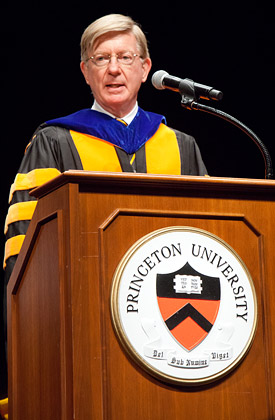
Advanced-degree candidates heard from columnist George Will, who earned his Ph.D. from Princeton in 1968 and was the first guest speaker in the history of the Hooding ceremony. (Photo by Denise Applewhite)
Hoods distinguish the wearer by both rank and academic discipline. Masters’ hoods generally are shorter by a foot than doctors’, and each hood is bordered by a velvet band in the color assigned to the discipline in which the degree is granted.
Tilghman congratulated the graduates and urged them to share their knowledge with the world outside universities.
“I hope you will communicate your passion for your discipline to others, through your teaching and through your participation in your community,” she said. “I hope you will make a point of explaining what you do — and why it matters — to your fellow citizens.”
Graduates also heard from syndicated columnist George Will, who was the first guest speaker in the history of the Hooding ceremony. Will earned his Ph.D. from Princeton in 1968.
“For many of you, your professional trajectory is clear. For others, there will be unanticipated destinations,” Will told the audience(Link is external). “All of you, however, will, I hope, feel one constant. I hope you will feel forever connected to Princeton — and especially to your academic departments — by cords of affection and gratitude.”
Will told the students to revel in their intelligence and their thirst for knowledge. He also spoke about how the world’s advances grew from another thirst — for beer. He told the McCarter crowd how beer brought forth agriculture, industry, advertising and even the United States itself. It was, of course, a tale told with tongue in cheek, but with a purpose.
“My brief and beer-centric history of civilization is intended to be playful in order to underscore the point that the life of the mind should be fun,” he said.
Will ended with congratulations and urged the graduates: “Go forth from here and have a beer. You have earned it.”
Graduation activities continue with the the University’s 265th Commencement ceremony(Link is external) at 11 a.m. Tuesday, June 5, on the lawn in front of Nassau Hall. A webcast of the Class Day and Hooding ceremonies will be available on the Princeton WebMedia site(Link is external).
(Additional reporting by Ian Cahir)
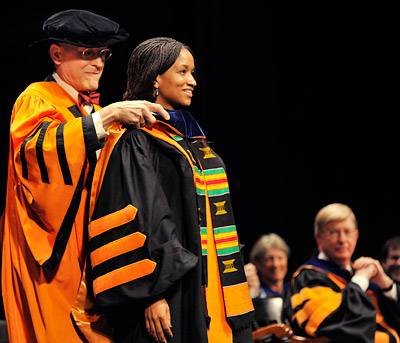
Chief marshal Douglas Clark presents Ann Marie Russell, a doctoral candidate in psychology and social policy, with her hood during the Hooding ceremony at McCarter Theatre. (Photo by Mark Czajkowski)

Candidates for masters’ and doctoral degrees, gathered in McCarter Theatre to receive their hoods, which distinguish the wearer by rank and academic discipline. (Photo by Denise Applewhite)
